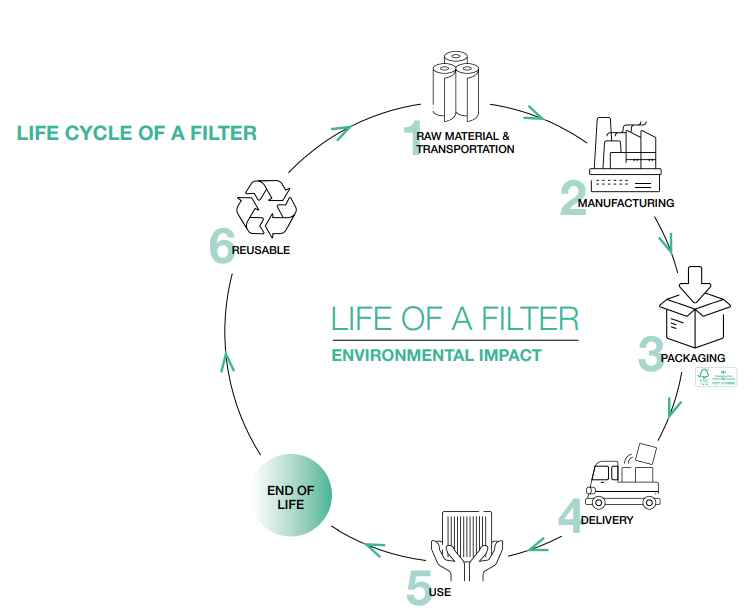Sustainably moving towards full circularity by 2050
Circularity, sustainability, carbon footprint; at AFPRO Filters, we are conscious of our impact on the environment and make informed choices to minimize this. We look beyond our annual figures and the continuity of our business and are committed to innovation and quality.
We are fully involved in making the transition from a linear to a circular business model. This immense change demands efforts from the entire chain, so that we engage in conversation with our customers and our suppliers alike.
Our sustainable choices and circular steps
In our advanced laboratories, we conduct daily research into how we can make our air filters even more efficient and sustainable and work on developing new filter media and filtering techniques.
Sustainability and energy consumption
AFPRO Filters is a pioneer in developing A and A+ label filters, enabling our customers to make a deliberate and sustainable choice. By choosing these filters, you significantly reduce the energy consumption and thus your carbon footprint.
We are also as frugal as possible with the energy we use ourselves, by making use of green electricity from solar panels and having our incredibly energy efficiently built modern logistics hub hooked up to the residual heat supply from the local household waste incineration plant. This has led to a 50% reduction in our energy consumption.
Circularity
In the production of our filters, we use as little plastic as possible. We opt for fiber glass and aim to reduce our use of plastic down to zero. In addition, we are very deliberate in our choice of using aluminum frames. Contrary to plastic which is used by many other manufacturers, aluminum is 100% reusable and recyclable.
The lifecycle of a filter
In order to be able to make the most sustainable choices moving towards full circularity, we have mapped the lifecycle of our filters. For each stage, we continually assess which sustainability and/or circularity improvements we may be able to implement.

Stage 1: Raw materials and transport
When choosing our suppliers, the environmental impact is an important selection criterion, and certificates and work procedures can form an overriding factor in the weighting. Where possible, we buy locally and opt for production facilities in the vicinity of our factories to minimize transport movements. Also, the loading of pallets and containers is meticulously planned to the millimeter to achieve efficient transport volumes and avoid shipping air.
Stage 2: Production process
We are one of the few air filter manufacturers who are ISO 14001 certified and work towards a zero-waste business. We achieve this, among other things, by making agreements with our suppliers about reducing packaging material. Also, the vertical integration of our production process enables us to reduce our production waste down to a minimum.
Waste reduction in our production processes is always at the forefront of our minds. As such, we have achieved significant results over recent years in terms of minimizing rest material, partly by deploying new machines and advanced software for smarter planning.
Stage 3: Packaging
The cardboard packaging (FSC certified) we use is made to measure and only serves as transport protection for the product delivered, but can also be used for packaging and disposing of used filters.
In order to optimize the customization process of cardboard boxes, we use an ultra-modern machine which makes an intelligent calculation based on the material to be packaged to deliver the right cardboard box to measure, resulting in savings in terms of cardboard, transport volume and unnecessary padding.
Stage 4: Delivery
We try to minimize transport movements and proactively approach our customers with the request to group their orders per delivery address as much as possible, while at the same time loading pallets as efficiently as possible to save on volume. We also deploy carbon neutral transport as much as possible. If this is not possible, we choose transport based on lorries that meet the Euro 6 emission standard.
Stage 5: In use
While our air filters are in use, they ensure a healthy indoor climate and energy saving. If you choose an A+ or an A label ePM1 filter, you choose the best air quality and the largest energy saving. A win-win situation; being beneficial for the end user as well as for the environment.
Stage 6: Re-use and recycling
We do our utmost to design our filters in such a way that the raw materials used can be reused in the best possible way. Also, recycling is a major consideration at all our production locations. In addition, we actively participate in initiatives and pilot projects for sorted collection, disposal and reuse of used filters and packaging material. This way, we can enable our customers to work even more waste free too and together we determine our next steps towards sustainability and circularity as we move towards full circularity by 2050.




